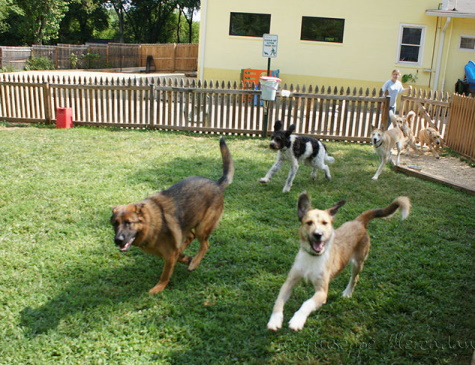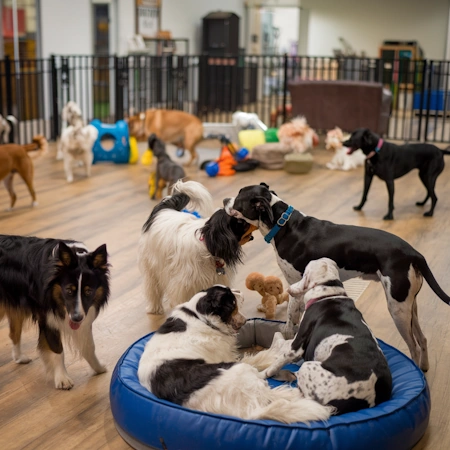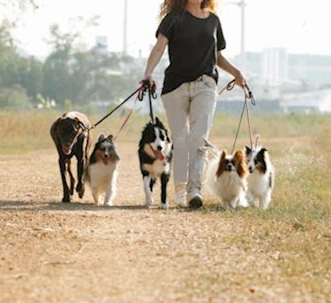Boarding Your Dog: What You Need To Know
Boarding your dog may make you a bit nervous, I know it did me the first time around. Finding a safe and comfortable place for your furry friend while you're away can be a daunting task. This is especially true if it’s the first time Fido will be without you.
I know it’s hard to leave your pet in someone else’s care, even for a day, but by going over the following boarding choices, you’ll be able to find a spot that’s just right for your dog to have a pet vacation. Not that he won’t miss you of course.😉
With a variety of choices—specialty boarding facilities, pet sitters, and vet clinics—how do you decide which is the best fit for your pet? Let’s go over your options, particularly if you have a senior dog with specific medical needs, and look at how to evaluate a pet sitter.

Boarding Options: What’s Out There?
Specialty Dog Boarding Facilities
These facilities often resemble luxurious dog resorts. They offer spacious accommodations, playtime with other dogs, and a range of activities like swimming or agility courses.
Pros:
- Supervised play and socialization.
- Luxurious amenities (such as cozy beds and grooming services).
- Staff members are often trained in canine behavior.
Cons:
- Can be expensive.
- Not all locations accommodate dogs with special medical requirements.
Spa-type Boarding Facilities
Similar to specialty facilities, spa-style boarding provides pampering services, including massages and grooming. These are perfect for dogs that relish a bit of indulgence.
Pros:
- High-quality care and pampering.
- A soothing environment that promotes relaxation.
Cons:
- Can be pricier than other options.
- Not all provide personalized care for seniors or dogs with health issues.
 Making New Friends
Making New FriendsVeterinary Clinic Boarding
Vet clinics are a practical choice, especially for dogs with medical needs. Your pet will be monitored by professionals capable of managing emergencies.
Pros:
- Available medical care if needed.
- Experienced staff for handling medical issues.
Cons:
- Usually more clinical and less engaging than other options.
- May lack ample playtime and socialization.
- May have fewer staff on weekends and overnight.

Boarding Your Dog vs Dog Sitters
Pet sitters are another option to consider and one which I have used myself for a dog that liked the one on one attention. You can take your dog to the dog sitter's home or have them come to your place.
Some dog boarding services might look more convenient than others, but what really matters is finding a place that puts your pup’s comfort and well-being first. Keep this in mind while you're researching and keep your radar turned on for any negative vibes.
So let's talk more about the pet sitting option.
Pet Sitter’s Home
Hiring a pet sitter to look after your dog in their own home
can be a wonderful alternative, especially for those who favor a more personal
care experience. Pet sitters will often keep you up to date on a daily basis by sending you text messages along with pics of your dog.
Pros:
- Customized care in a comfortable home setting.
- Can be less stressful for your dog.
- Can screen for one that only takes one dog at a time.
- Drop off and pick up times are more flexible.
Cons:
- The sitter’s level of experience may vary.
- Might not be suitable for every situation.
Pet Sitter Staying at Your Home
If your dog prefers their own space, this option might be ideal. The sitter comes to your home, keeping your dog's routine intact.
Pros:
- Familiar environment for your dog.
- Minimal changes to your dog's daily schedule.
- House is more secure when occupied.
- Walking routes are familiar.
Cons:
- Generally more costly than other options.
- You must ensure the sitter is trustworthy and reliable.

Evaluating and Choosing a Pet Sitter
When hiring a pet sitter from either a local or national agency, such as Trusted Housesitters, Fetch, Rover, or Wag, it’s essential to find someone who is trustworthy and dependable. Here are some tips for assessing potential pet sitters:
Check Credentials and Experience
- Look for sitters with relevant experience, particularly with senior dogs or those requiring medication. CPR and first aid training is a plus.
- Many agencies offer profiles showcasing qualifications and client reviews. Be sure to read reviews. Filter the reviews that resonate with you for other requirements, such as licensing, experience level, number of pets in their care, location, and price.
- Conduct your own Background check especially if sitter is staying in your home. For more peace of mind, check if sitter is listed with National Association Of Professional Pet Sitters (NAPPS)
Ask for References
Feel free to request references from past clients. A reputable sitter will gladly provide them or even offer them before you ask.
Contact these references to hear about their experiences directly.
Conduct an Interview
Arrange a meet-and-greet with prospective sitters. Pay attention to how they interact with your dog.
Inquire about their experience handling medical needs, daily routines, and emergency protocols.
Discuss Your Dog’s Needs
Clearly outline your dog’s specific requirements, such as feeding
schedule, medications, and any behavioral quirks.
An attentive sitter will ask questions to fully understand your dog's needs.
Evaluate Insurance and Bonding
If you’re going through an agency such as the one I referred to earlier, confirm that they have adequate insurance and bonding.
This protects you and the sitter in the event of accidents or issues.
Boarding Your Dog - Trial Run
If possible, consider arranging a brief trial stay or a drop-in visit to see how your dog interacts with the sitter. This can help determine if they are a good match before committing for a longer period.
Make use of a pet cam if you plan to hire a pet sitter, or even if you always like to keep an eye on your pet while you pop out briefly or work.
Focus the cam in the area your pet usually hangs out or takes a nap. Be sure the pet sitter if aware of the cam.
Preparing
for Boarding Your Dog: What to Bring
No matter where you choose to board your dog, here are some items you may need to supply:
- Food: Bring enough of your dog’s regular food for the duration of their stay.
- Medications: If your senior dog has any medical needs, don’t forget their medications. Include clear instructions on dosage and timing.
- Favorite toy(s)
- Name of Veterinarian including contact information
- Contact details of urgent animal clinic to use if needed
- Spare collar and leash
- Copy of Dog License and Rabies Certificate
Wrapping It Up
I hope I have now provided you with enough information so that you'll be confident in finding the perfect home away from home for your pet.
Other related articles:
Before You Go...
If you like the content of this page, as well as others on my site, please give it some love by clicking on the heart in the lower right hand corner. This helps me to keep providing enjoyable and useful content.
Thank you.



